Common Language Speaks Out
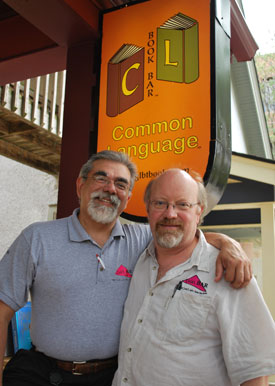
Martin Contreras and Keith Orr, co-owners of Common Language Bookshore, also own the aut BAR, located next door. (Photo by the writer.)
Less than two weeks after Shaman Drum Bookshop announced plans to close, the owners of another independent Ann Arbor bookstore are saying they could be next.
On Friday, Keith Orr – co-owner of Common Language Bookstore – sent an email to customers laying out the situation that his business faces: “There is no easy way to say this,” he wrote. “Common Language is not making enough sales to support itself. Its very existence is in peril.”
After a Chronicle reader forwarded the email to us on Monday, we went over to the store in Kerrytown’s Braun Court to talk with Orr. Sitting in the shaded courtyard in front of the shop he owns with partner Martin Contreras, Orr spoke about why they decided to reach out for help, and how he hopes the community will respond.
Contreras and Orr have been subsidizing the store with their personal savings and with money from another business they own, the \aut\ BAR, which is located in an adjacent building. They can’t continue that indefinitely – sales have to increase to support the store. Though there is a sense of crisis, Orr says, they aren’t planning to shut their doors next week or even next month. Yet they wanted to alert the community that they are struggling, and if they can’t find a way to make the bookstore financially sustainable, they’ll have to close.
Certainly the economy has played a role in the past year or so, Orr says. Longer term, the trend toward buying books online – specifically, the lure of low prices at Amazon.com – has seriously undercut the business of independent bookstores like Common Language.
If judged merely by price, then Amazon.com would be the clear winner, Orr says. But independent bookstores have a much larger function than just delivering product. And because of Common Language’s focus – the store sells books, CDs, DVDs and other items with gay, lesbian, bisexual, transgender and feminist themes – “for us, it’s a matter of being a safe space,” he says.
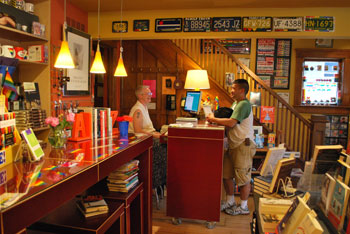
Jerri Dodge, the bookstore's manager, talks with customer Shaun Farmer on Monday afternoon. (Photo by the writer.)
Even in the “Ann Arbor bubble,” Orr says, if you’re a teenager starting to discover your sexuality, or if you’re 45 and married and starting to rethink your life, it’s not easy to find your way. You need a place you can go for information and, more importantly, to find a community that accepts you.
Independent bookstores serve another purpose, too. Many authors have a hard time getting published except by niche publishers, and those publishers need independent bookstores as an outlet to sell their books. Orr gives the example of Augusten Burroughs, author of “Running with Scissors,” who got his start with support from the independents. Orr estimates that 95% of the authors whose work Common Language sells fit that category.
Common Language’s support of non-mainstream authors is clear from the books that line its shelves. Equally obvious is the shop’s success in building community, like the customer who showed up Monday afternoon with a plastic cup filled with red roses that he gives to Jerri Dodge, who manages the store. That community is centered in Braun Court, where Orr and Contreras moved Common Language in 2005 – they bought the business from Lynden Kelly in 2003, when it was located a few blocks away on Fourth Avenue. They own four of the buildings in Braun Court, all built in the early 1900s. In addition to the bookstore and popular \aut\ BAR, the buildings house the SH\aut\ performance space and the nonprofit Washtenaw Rainbow Action Project, known as WRAP.
The LGBT-focused cluster is a destination spot not just for people visiting Ann Arbor. Over the years the Kerrytown area has become a “gayborhood,” Orr says – it’s included in Wikipedia’s listing of urban areas known as social centers for the gay community.
These are the kinds of things that could be diminished or lost if the bookstore closes.
Orr says they’ve cut costs and tried to find ways to increase sales. They’ve gone to LGBT conferences and festivals, and they’ve tried to capture online sales through the store’s website. They’ve run promotions connected to the \aut\BAR – 10% off an entree if you buy something that same day at the bookstore. (Orr says that while nearly everyone who goes to Common Language knows about the bar, the reverse isn’t true.)
So far, their efforts haven’t been sufficient, so now they’re reaching out. In addition to Orr’s letter of appeal, they’ll try to spread the word in other ways. On July 8, for example, Orr will be interviewed about the fate of the bookstore on Closets Are for Clothes, a talk show on 88.3 WCBN-FM that’s focused on gay issues.
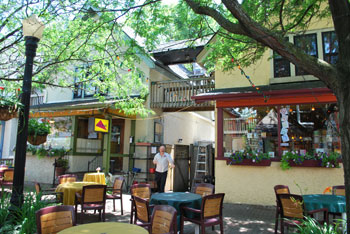
Keith Orr comes through a gate that separates Common Language (on the right) from the autBAR. (Photo by the writer.)
Orr has been quite clear in suggesting the kinds of concrete things that people can do to help. He’s set up an online pledge form for direct contributions. He’s encouraging folks to come to the store and buy books or any of the other products they sell – T-shirts, bumper stickers, cards, rainbow flags, pet accessories, and erotica. Getting people in the door is important: The store has a high ratio of sales to customers, Orr says – when people come in, they usually buy something. He’s also asking that people become advocates, telling their friends about the store and its website.
One thing they haven’t done is to move heavily into pornography, which Orr says is the path that many LGBT bookstores have taken. The store does sell a selection of erotica and other sexually explicit material – its second-floor “playroom” isn’t for prudes – but that section isn’t the focus of the store by any means. Orr says that even if they wanted to expand in that way, he’s not convinced it would be successful in solving their financial problems.
Since receiving Orr’s email, customers have come up with their own suggestions too. A local handyman said he can’t afford to buy books, but he’s offered to donate his services if anything in the building needs repair. Someone else said they’d help set up a Twitter account for the store, and strategize about how best to use it to bring business into the shop. Others who no longer live in this area have pledged to buy their books from Common Language online.
Their strong community ties should help, too. Orr is a board member of the Ann Arbor Downtown Development Authority – The Chronicle profiled him as a new member last year. The couple has long been active in fundraising – they were finalists in 2008 for the Ann Arbor News Citizen of the Year award, recognized for their contributions to local nonprofits. Just this past weekend they hosted Tree Town Pride, formerly known as PrideFest – this year, state Rep. Pam Byrnes came and spoke about recent same-sex marriage legilsation she has introduced.
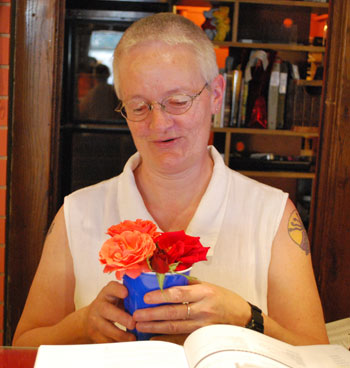
Jerri Dodge, who manages the bookstore, with some flowers brought in by a customer. (Photo by the writer.)
But generating community support was a strategy that Karl Pohrt tried, too, and it wasn’t enough to save Shaman Drum. Orr says there are key differences giving him hope that Common Language will have a different fate. For one, Shaman Drum is a general interest independent, not a niche store like Common Language. Orr says general interest stores are having an even tougher fight competitively, because it’s harder to differentiate their offerings. Shaman Drum was also larger than Common Language, making it harder to adjust.
Orr also believes that people thought Pohrt had “fixed” the situation by moving to become a nonprofit. Well before the decision to close Shaman Drum, Pohrt had announced plans to form the Great Lakes Literary Arts Center – that application process with the IRS is still underway. It’s possible that the effort made customers think the financial challenges had been solved, Orr said.
So they’ll see how the summer goes, and the fall textbook season as well – like Shaman Drum, but to a lesser degree, Common Language sells books used in University of Michigan courses, primarily in women’s studies and gender studies. They’ll reassess later in the year, Orr says, to see if things have improved.
If Common Language isn’t yet self-sustaining by then, they’ll have some hard decisions to make.




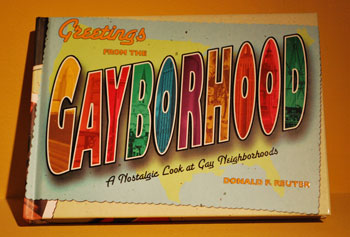
Well done, Mary. Big hugs from SoFla!
And good luck, Keith and Martin.
So sorry to hear this. Common Language has been owned & run by remarkable people since it opened. I hope they have a lucky summer.
So sorry to hear this. One of A2′s biggest appeals is it’s indie bookstores. Common Language, our thoughts are with you……
well it is ann arbor…maybe you could close it and open a Noodles and Co.